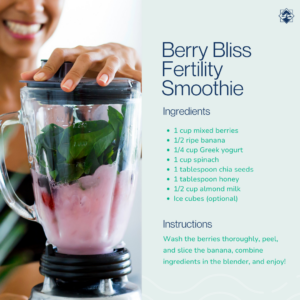Nourishing Fertility: Foods That Can Help Preserve Your Reproductive Health
The foods we consume play a crucial role in supporting reproductive health. Making mindful choices based on each phase of your menstrual cycle can contribute to your overall well-being on your fertility journey. Let’s dive in and discover the culinary keys to preserving your reproductive vitality:
Menstruation: Embracing Nutrient-Rich Comfort
During your period, it’s essential to focus on replenishing lost nutrients and easing discomfort. Eating foods that are rich in iron like spinach, lentils and lean meats can help to combat fatigue. Fish, beans, meat, and other protein-heavy foods can also help ease cramps and prevent anemia if you are prone to bleeding heavily.
Follicular Phase: Fueling Up for Growth
As your body prepares for ovulation, it’s important to prioritize foods that support cell growth and energy. Complex carbohydrates like whole grains, sweet potatoes and legumes are great for boosting energy levels while vitamin b-rich foods like eggs, leafy greens and avocados help promote a balanced mood. Cabbage, kale, and broccoli contain diindolylmethane, a phytonutrient that promotes better metabolization of estrogen to reduce excess estrogen.
Ovulation: Maximizing Nutrient Intake
Ovulation marks a peak in fertility, so focus on nutrient-dense foods to support this vital phase.
- Nutrient-Dense Choices: Prioritize nutrient-dense foods during ovulation to enhance fertility.
- Cell Division Support: Boost cell division with folate-rich options such as leafy greens, citrus fruits, and beans.
- Healthy Fats for Hormones: Optimize hormone production by including foods high in healthy fats.
- Omega-3 Rich Selections: Incorporate omega-3-rich foods like salmon, chia seeds, and flaxseeds for added fertility support.
Luteal Phase: Hormonal Balance and Sustained Energy
The best fertility preservation foods to eat during your luteal phase are leafy greens, carrots, and sweet potatoes, which contain plenty of beta-carotene. Beta-carotene helps to regulate hormones and encourages cell growth. Pineapple is another great food to eat to boost fertility during the luteal phase because it contains bromelain, an anti-inflammatory substance shown to support the implantation of an egg.

Incorporating fertility-friendly foods into your diet is a delicious and proactive way to support your reproductive health. Remember, these dietary choices are just one aspect of the holistic approach to fertility. Schedule a consultation with the experts at Viera Fertility Center for personalized guidance on your pregnancy journey.